Viaduct Foundation Design for Geohazards in Kicking Horse Canyon
Publication: Geo-Congress 2024
ABSTRACT
The Trans-Canada Highway passes through very steep terrain in the Kicking Horse Canyon east of Golden, BC, and a series of recent projects have improved and widened the highway through the region. Construction of the final and most technically challenging segment is now underway with the Kicking Horse Canyon Phase 4 design build project. The existing highway crosses a series of unstable slopes, active landslides, large ravines, and avalanche and rockfall paths. Key project goals were to improve the safety of the roadway and reduce geohazard risk. The required highway geometry combined with upslope geohazards and steep terrain required significant portion of the alignment to be constructed on the steep slopes below the existing highway which have marginal stability. The conventional solution for construction on steep slopes below the highway has been to support the highway on grade with downslope retaining walls, which are stabilized by piles below. When considering this option following completion of the geotechnical investigation for detailed design, it became apparent that due to a number of factors, including higher walls and deeper bedrock than expected, large diameter piles at very tight spacing would be required to meet project specifications for slope stability. These piles would be costly, time consuming to install, and there would be significant safety challenges associated with the heavy piling equipment required on the steep slopes for long durations. A bridge solution was therefore proposed to carry the roadway on structure over the unstable slopes. An innovative viaduct design was developed and was adopted for nine individual viaduct structures totaling over 1.8 km of highway length. The viaducts have regular 23 m spans with substructures consisting of precast concrete cap beams at each pier supported on three concrete-filled steel pipe piles drilled into bedrock. The highway is supported on the structures, and the piers were designed to resist the loading from slope movements, thus avoiding the need to stabilize the entire slope. There are no established design methodologies in geotechnical practice for design of piles embedded in a moving embankment, other than in seismic design for liquefiable soils. New methodologies were developed drawing on first principles and existing stabilization pile methodologies. Close coordination was required between the structural and geotechnical engineers to find solutions for a variety of different loading situations, ground slopes and below-ground bedrock surfaces, and an active landslide zone that was actively moving during construction. Other extreme loadings were also required to be defined and designed for including debris flow, rockfall, and avalanche impacts. This paper discusses the many design, loading, and constructability challenges faced in the foundation designs.
Get full access to this article
View all available purchase options and get full access to this chapter.
REFERENCES
Ardalan, H., and Ashour, M. (2013). Analysis of Landslides and Slopes Stabilization Using One Row of Piles. Deep Foundation Institute and University of Alabama in Huntsville.
Kourkoulis, R., Gelagoti, I., Anastaspoulos, and Gazetas, G. (2011). “Slope Stabilizing Piles and Pile Groups: Parametric Study and Design Insights”. ASCE Journal of Geotechnical and Geoenvironmental Engineering, Vol. 137, No. 7, July 1, 2011.
Kourkoulis, R., Gelagoti, I., Anastaspoulos, and Gazetas, G. (2012). “Hybrid Method for Analysis and Design of Slope Stabilizing Piles”. ASCE Journal of Geotechnical and Geoenvironmental Engineering, Vol. 138, No. 1, January 1, 2012.
Poulos, H. G. (1995). “Design of reinforcing piles to increase slope stability”. Canadian Geotechnical Journal, Vol. 32, pp 808–818.
Information & Authors
Information
Published In
History
Published online: Feb 22, 2024
ASCE Technical Topics:
- Bridge engineering
- Bridges
- Bridges (by type)
- Construction engineering
- Construction management
- Design (by type)
- Engineering fundamentals
- Foundation design
- Foundations
- Geohazards
- Geomechanics
- Geotechnical engineering
- Highway and road design
- Landslides
- Load factors
- Pile foundations
- Piles
- Project management
- Slope stability
- Slopes
- Structural design
- Structural engineering
- Viaducts
Authors
Metrics & Citations
Metrics
Citations
Download citation
If you have the appropriate software installed, you can download article citation data to the citation manager of your choice. Simply select your manager software from the list below and click Download.
